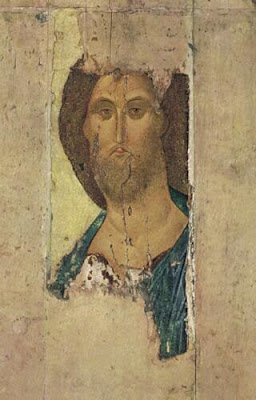In the New Testament Christ is a called the 'ransom', or 'redemption', for the sins of the human race (Matt.20:28; 1 Cor.1:30). The original Greek word lytrosis means 'ransom', that is, a sum of money the payment of which gives freedom to a slave or life for someone sentenced to death. The human person fell into the slavery of sin and required redemption in order to liberate him from this slavery.
The early Church writers posed the following question: to whom did Christ pay this ransom for humanity? Some suggested that the ransom was paid to the devil through whom humans had become enslaved. Origen, for example, asserted that the Son of God surrendered His spirit into the hands of the Father and gave His soul to the devil as a ransom for humanity. St Gregory the Theologian rebuked Origen for his interpretation of redemption: 'If the great and most glorious blood of God the high priest and sacrifice is given as the price of redemption to the evil one, then how grievous this is! The brigand receives not only the price of the ransom from God, but God Himself!'
St Gregory of Nyssa interprets the redemption as 'deception' and a 'bargain with the devil'. Christ, in order to ransom people, offers the devil His very own flesh, 'concealing' beneath it the Divinity; the devil rushes upon it as bait, but swallows along with the bait the 'hook', Christ's Divinity, and perishes.
A different interpretation has it that the ransom was paid not to the devil, as he has no power over humans, but to God the Father. This point of view was articulated by some Western medieval theologians (in particular, by Anselm of Canterbury). They claimed that primordial humanity's fall aroused God's anger and that divine justice necesserily required satisfaction: as no human sacrifice could suffice, the Son of God Himself became the ransom in order to satisfy divine justice. Christ's death satisfied divine anger and grace was returned to the human race. The acquisition of this grace is impossible without certain merits like faith and good works. Since humans do not possess these merits, they can derive them from Christ and from the saints, who in their lives accomplished more good works than was necessary for their salvation, and so had them in abundance to share. This theory, which rose at the heart of Latin scholastic theology, bears a juridical stamp and reflects the medieval concept of an offended honour that demands satisfaction. According to this understanding, the death of Christ does not abolish sin, but merely liberates the human person from responsibility for it.
The Eastern Orthodox Church reacted to this understanding in the twelfth century. The Local Council of Constantinople, which was convoked in 1157, stated that Christ brought His redemptive sacrifice not to the Father alone, but to the Trinity as a whole: 'Christ voluntarily offered Himself as a sacrifice, offered Himself in His humanity and Himself accepted the sacrifice as God with the Father and the Spirit... The God-man of the Word offered His redemptive sacrifice to the Father, to Himself as God, and to the Spirit...'
Many early church authors avoid altogether the topic of 'ransom' in the literal sense, taking redemption to mean the reconciliation of the human race with God and adoption as His children. They speak of redemption as the manifestation of God's love for humanity, a view supported by the words of St John the Theologian: 'For God so loved the world that He gave His only Son, that whoever believes in Him should not perish but have eternal life' (John 3:16). It is not the anger of God the Father but His love that lies behind the sacrificial death of His Son on the Cross.
Every human being is recreated and renewed in Christ. The redemptive act of Christ was not accomplished for an abstract 'mass' of people, but for each concrete individual. As St Symeon says, 'God sent His only-begotten Son to earth for you and for your salvation, for He has seen you and destined you to be His brother and co-heir'.
It is in Christ that the whole history of the human race receives justification, perfection and absolute meaning, including the Fall and expulsion of humans from Paradise. The Incarnation of Christ and His redemptive act have even greater meaning for humans than the very act of their creation. From the moment of God's Incarnation our history begins anew: we find ourselves again face to face with God, so close to Him, and perhaps even closer to Him than were the first human beings. Christ brings us into the 'New Paradise', the Church, where He reigns and where we co-reign with Him.
It is in Christ that the purpose of human existence is realized: communion with God, union with God, deification. According to a work ascribed to St Maximus the Confessor, God 'yearns for the salvation of all men and hungers after their deification'. In His immeasurable love for humans Christ ascended Golgotha and endured death on the Cross, which reconciled and united the human race with God. --Diocese of Sourozh



No comments:
Post a Comment